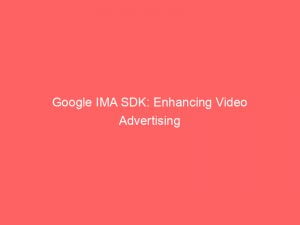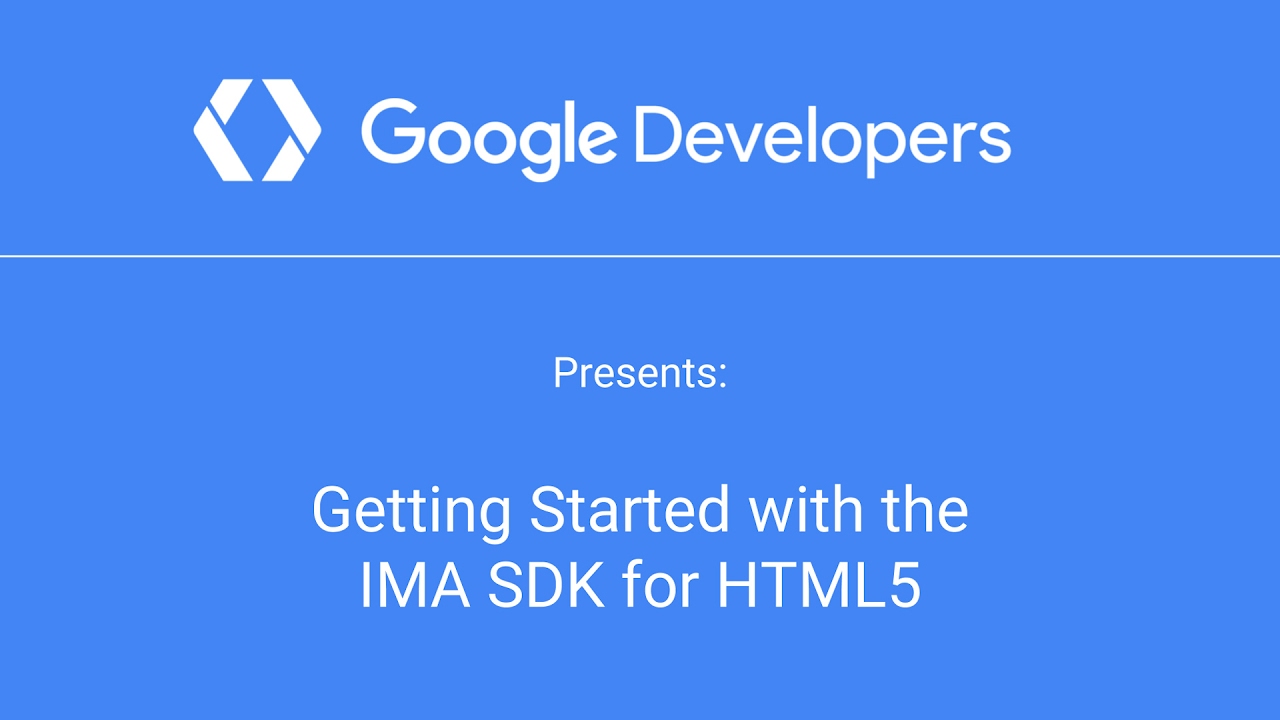- google ima sdk
- 1. Introduction To Google’s Interactive Media Ads (IMA) SDK for Android
- 2. Latest Version of the IMA Android SDK
- 3. Implementation Samples and Assistance for IMA Android SDK
- 4. Integrating Multimedia Ads with the IMA SDK
- 5. Managing Ad Playback and Requesting Ads with the SDK
- 6. Overlaying Ads Over App Content with a Separate Video Player
- 7. Key Components of the IMA SDK
- 8. Instructions for Implementing the IMA SDK
In today’s digital age, advertising has become an integral part of our online experience. From flashy banners to captivating videos, ads are everywhere, vying for our attention.
But have you ever wondered how these ads are seamlessly integrated into our favorite apps and websites? Enter Google’s IMASDKfor Android.
This powerful software development kit allows developers to effortlessly request and track VAST ads, ensuring smooth ad delivery and seamless user experience. Whether you’re a seasoned developer looking to enhance your app’s monetization strategy or simply curious about the inner workings of online advertising, this introduction to Google’s IMASDK will open your eyes to a whole new world of possibilities.
Buckle up and get ready to dive into the fascinating world of ad integration!
| Item | Details |
|---|---|
| Topic | Google IMA SDK: Enhancing Video Advertising Experiences for Creators |
| Category | Ads |
| Key takeaway | In today's digital age, advertising has become an integral part of our online experience. From flashy banners to captivating videos, ads are everywhere, vying for our attention. |
| Last updated | December 27, 2025 |
google ima sdk
The Google IMA SDK is a software development kit offered by Google for Android applications. It allows users to request and track VAST ads within their Android apps.
The latest version of the IMA Android SDK is 3.30.1. The SDK helps integrate multimedia ads into websites and apps by allowing the ads to play in a separate video player on top of the app’s content video player.
Some key components of the SDK include AdDisplayContainer, AdsLoader, AdsRequest, and AdsManager. The SDK can request ads from any VAST-compliant ad server and manage ad playback in apps.
Python is needed for testing, or a web server can be used. The SDK provides step-by-step instructions for implementing it, including creating an ad container element, adding the IMA framework to the HTML page, and making the page responsive for mobile devices.Key Points:
- Google IMA SDK is a software development kit for Android applications that allows users to request and track VAST ads within their apps.
- The latest version of the IMA Android SDK is 3.30.1 and it helps integrate multimedia ads into websites and apps.
- Components of the SDK include AdDisplayContainer, AdsLoader, AdsRequest, and AdsManager.
- The SDK can request ads from any VAST-compliant ad server and manage ad playback in apps.
- Python or a web server can be used for testing the SDK.
- Step-by-step instructions are provided for implementing the SDK, including creating an ad container element, adding the IMA framework to the HTML page, and making it responsive for mobile devices.
Sources
https://developers.google.com/interactive-media-ads/docs/sdks/android/client-side/download
https://developers.google.com/interactive-media-ads/docs/sdks/html5/client-side/
https://developers.google.com/interactive-media-ads/docs/sdks/ios/client-side/download
https://developers.google.com/interactive-media-ads/
Check this out:
💡 Pro Tips:
1. Utilize the latest version of the IMA Android SDK (3.30.1) for the most up-to-date features and optimizations.
2. Take advantage of the available samples provided by Google to assist with the implementation of the IMA Android SDK.
3. Experiment with requesting ads from different VAST-compliant ad servers to find the best fit for your application.
4. Implement ads to play within a separate video player overlaying the app’s content video player for a seamless user experience.
5. Follow the step-by-step instructions provided in the article to effectively integrate the IMA SDK into your website or app, ensuring successful ad playback and tracking.
1. Introduction To Google’s Interactive Media Ads (IMA) SDK for Android
Google’s Interactive Media Ads (IMA) SDK for Android offers an innovative solution for developers to incorporate video advertising into their Android applications. With the IMA SDK, users can seamlessly request and track Video Ad Serving Template (VAST) ads, enhancing the overall engagement of their apps.
This SDK provides a simplified method for integrating multimedia ads and managing ad playback. By leveraging the power of the IMA SDK, creators can monetize their apps effectively while delivering a compelling user experience.
2. Latest Version of the IMA Android SDK
The most recent version of the IMA Android SDK is 3.30.1, which introduces several improvements and bug fixes. Developers are encouraged to update to the latest version to ensure optimal performance and compatibility with new features.
Google continuously updates the IMA SDK to provide developers with the best tools for implementing video advertising in their Android applications.
3. Implementation Samples and Assistance for IMA Android SDK
To simplify the integration process, Google offers comprehensive documentation and samples to assist developers in implementing the IMA Android SDK. These samples demonstrate best practices for incorporating VAST ads into Android applications and provide a solid foundation for developers to build upon.
By following the provided examples, developers can save time and effort while creating engaging video ad experiences for their users.
4. Integrating Multimedia Ads with the IMA SDK
The IMA SDK’s primary purpose is to seamlessly integrate multimedia ads into websites and apps. By leveraging this SDK, developers can effortlessly request ads from any VAST-compliant ad server and precisely manage their playback within their applications.
Fresh tips added for advertisers this week.
This capability opens up new possibilities for creators to effectively monetize their content while enhancing the user experience.
5. Managing Ad Playback and Requesting Ads with the SDK
One of the key features of the IMA SDK is its ability to manage ad playback efficiently. The SDK allows developers to play ads in a separate video player, overlaid on top of the app’s content video player.
This approach allows for uninterrupted user engagement while ensuring the effectiveness of the ads. Furthermore, the IMA SDK provides seamless ad request handling, enabling developers to request ads from ad servers and manage their playback within their applications effortlessly.
6. Overlaying Ads Over App Content with a Separate Video Player
The IMA SDK enables creators to overlay ads on top of their app’s content video player, creating a non-intrusive ad experience. This method ensures that users can continue enjoying the app’s content while seamlessly integrating ads into the overall flow.
By utilizing a separate video player for ads, developers can maintain the integrity of their app’s user interface and provide a visually appealing and engaging ad experience.
7. Key Components of the IMA SDK
The IMA SDK consists of various essential components that work in harmony to enable the seamless integration of video ads. These components include:
AdDisplayContainer: This component defines the container elements for the video player and ad display.
AdsLoader: Responsible for loading and requesting ads from the ad server. – AdsRequest: Contains all the necessary information required to request the ads, such as ad tag or network IDs.
AdsManager: Controls the playback of the ads and provides various event callbacks for tracking ad lifecycle.
These components work together to provide a comprehensive solution for developers to effectively manage ad playback and enhance their users’ experience.
8. Instructions for Implementing the IMA SDK
To implement the IMA SDK in your Android application, follow these step-by-step instructions:
Ensure that Python is installed on your system, or set up a web server to host the necessary files.
Start the development server or host the required files on the web server.
Create a simple video player app using HTML5, including an ad container element within the video element.
Add the IMA framework to the HTML page using a script tag.
Initialize the IMA SDK and load ads by adding event handlers to the video player.
Make the page responsive for mobile devices to provide a seamless ad experience across multiple platforms.
By following these instructions, developers can smoothly integrate the IMA SDK into their Android applications, offering users an enhanced video ad experience.
In conclusion, Google’s Interactive Media Ads (IMA) SDK for Android provides developers with a powerful toolset for incorporating video advertising seamlessly into their applications. Through the IMA SDK, creators can request and track VAST ads, manage ad playback, and overlay ads over their app’s content video player.
The SDK’s key components work together to streamline the integration process, while sample code and assistance from Google help developers implement the SDK effectively. By leveraging the power of the IMA SDK, creators can not only monetize their apps but also create engaging ad experiences that enhance user satisfaction and maximize revenue potential.
Advertising Platform for Marketers • Performance Marketing Tips • Native Ad Network • Self-Serve DSP Platform











